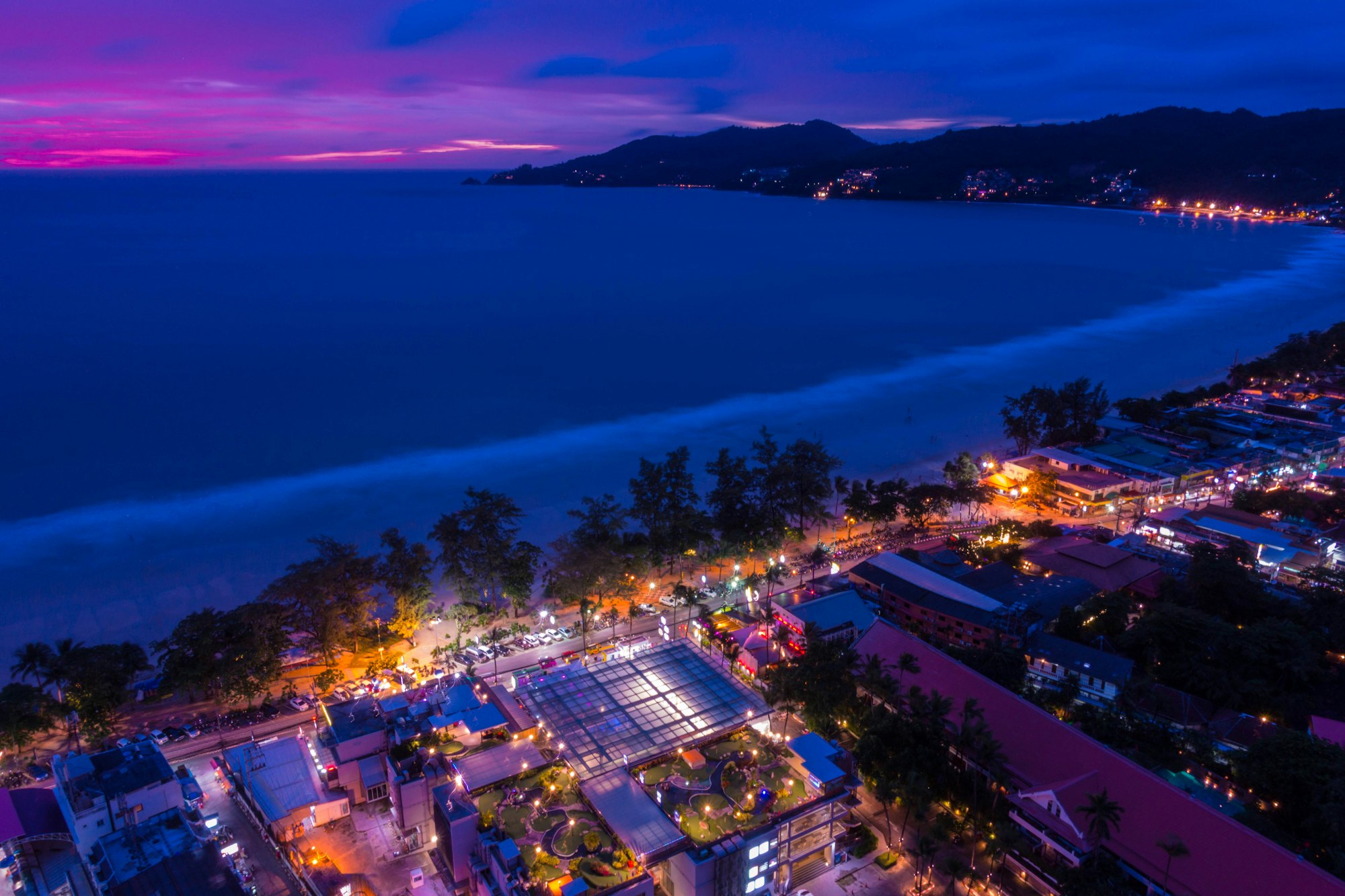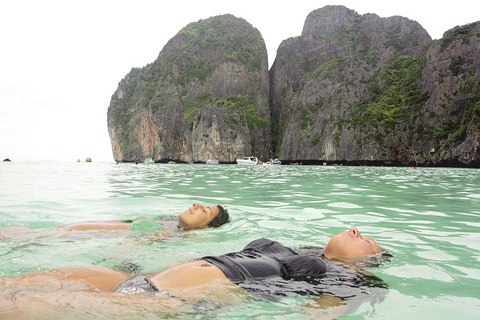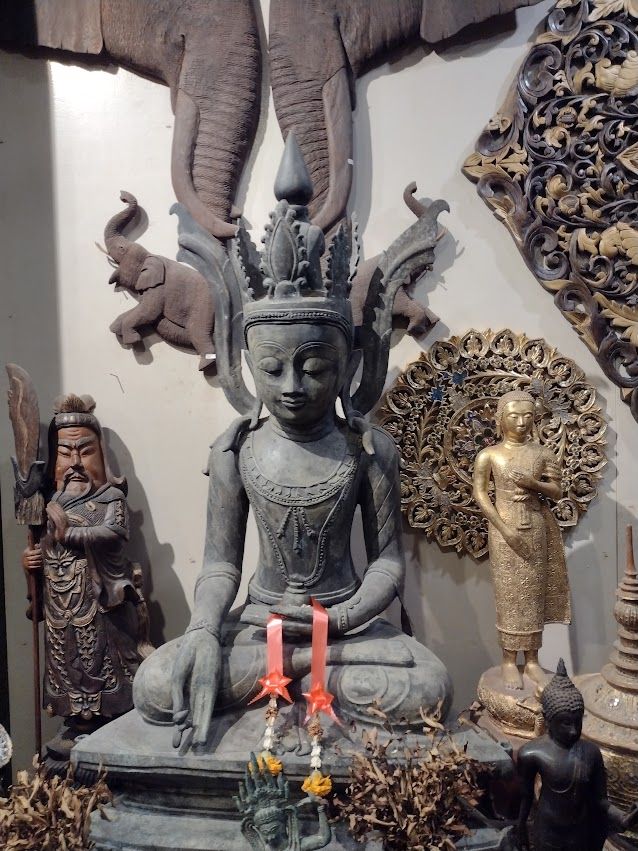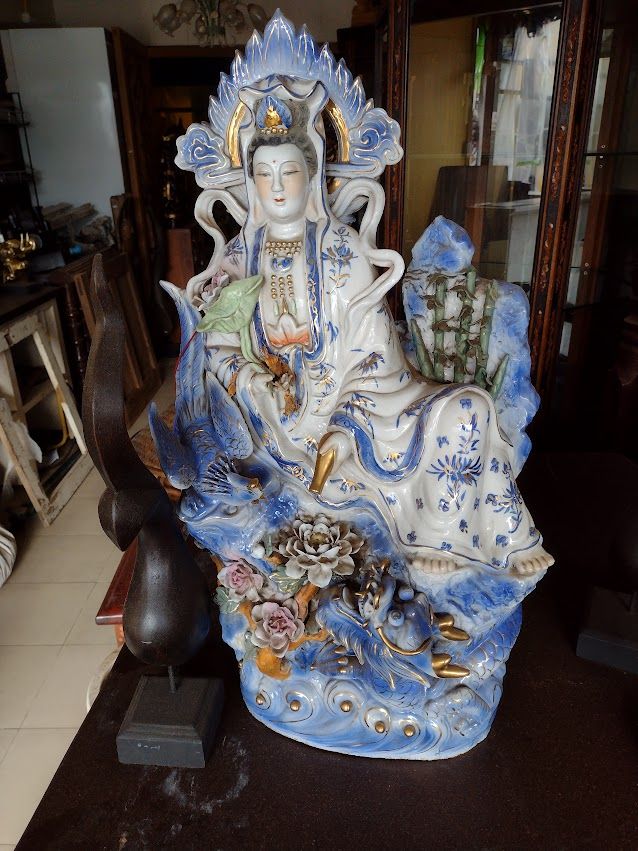
An isolated town grows and grows and explodes and becomes a party town/ ex-pat haven. Where does one go to "get away from it all" any more?
In my rush to get a trip to Thailand booked when the costs to go to Bhutan skyrocketed out of reach, I made some critical errors. One was to trust that my blind luck would hold out (it didn't), and the other was to purchase non-refundable hotel stays to save a few dollars.
Lessons learned.
I had excuses: a house being put up for sale, last-minute deliveries of more stuff to the local consignment store, moving the last of my things in the garage, the list was endless. You could excuse me for leaving a certain percentage of this to the Fates.
But.
I love quiet, calm, isolated places from where I can travel to adventure, which is usually in heavily-touristed areas. I don't care to be right in the middle of one, but that's exactly what I managed to do to myself this trip. Twice, in fact, but I'll just concentrate on the Phuket/Patong area.
Patong, like much of Thailand, and the offshore islands were once the very definition of paradise. Much has changed in the ensuing years, most particularly and most drastically after Leonardo diCaprio's The Beach effectively invited the world to descend on the place.
The influx has been kind only to developers, really.
I am on my second day here in Patong, party town, further up the road from sleepy, sweet Kamala Beach where I'd stayed before. Kamala is a Muslim community, and as such my experience of it was memorable for the lack of intense partying and noise. I had forgotten the name of the place, so leapt at another town which, quite wrongly, I hoped might turn out to be equally appealing.
Appalling, more like it. But that's only if you like quiet. Are a light sleeper. Are up well before dawn.
Most folks around here are just the opposite- at least the tourists. Those who have to serve them are more like me.
Motorcycles rush by at all hours. Most feature locals delivering Grab food orders or carry aging White men with the ubiquitous Gross National Product- the young Thai girl-riding behind them. I no longer question it; it's an agreed-upon contract and therefore nunna my beeswax. Girls and "lady men" here groom themselves for rich Western men, hoping to bait the hook well enough to catch someone with a wallet.
Still, it's nowhere near that simple as being solely about sex. As someone close to seventy, and who only recently finally gave up on dating, before I left that world I was struck by how many aging White men were far less interested in a partner than caretaker. That is just one of the many motivations that draw White Western men here, for we aging Western women, finally divested of our children, don't want caretaking jobs for another as we age.
That leaves many aging men, those who perhaps had funds but no fun future due to failing health, to search elsewhere. This thoughtful piece of reading delves into the deeper reasons behind such pairings, and how much of it grew out of a shrinking agrarian society and the traditional responsibilities of the daughters to family and the aged.
In all fairness to both parties, this can, given the right circumstances, bode very well for the Thai woman. If the pairing works out, and especially if she is able to send money home, then other families can be highly motivated to replicate that success. As with all things, good news spreads fast, but it doesn't always result in similar outcomes. Young girls are simply commodities for the benefit of the family.
In other parts of the world, young boys and men groom themselves for rich over-sixty women. So often in those cases it is indeed about the sex, sometimes about companionship, but not always caretakers. Either way, the way I see it, it's colonialism at its absolute worst in both situations. Here's a typical article on the topic:

Such predation is everywhere. The Thai sex trade business just happens to have honed it to perfection, today among many nations plying the trade. As I have written elsewhere, the American appetite for sex slave trade is insatiable and the biggest in the world. Some folks just want love. That too is part of the picture. The problem as I see it is that everything's for sale, including daughters. That's always been the case in a male-dominated society. Now, I guess, sons too.
Since I am in that over-sixty female cohort, I fear that some locals may assume I'm in the market myself. Oy. Not even. Kindly, I just wanted to enjoy the trees, the beach, the temples, the quiet and the deeply kind nature of the Thai people.
Where I am right now, no way, other than the kind people, of which there are plenty. But they are kind often because there is something they want, not just because it is part of the culture.
Around my hotel is a warren of shops, predictable as they are in all Thai tourist areas: massage parlor, food, laundry, massage parlor, food, laundry, with the occasional restaurant tossed in, and the odd air-conditioned coffee shop for those of us still unable to handle the combination of heat and humidity.
That last is where I walked to burn off the hours until my room opened. I drank sweet coffees until noon, watching life march by. The best part of such places is that every so often you meet someone genuinely interesting. I did, too.
It's very, very noisy here, day and night. I had to move my room to the top floor to escape some of it. And not all the noise is good. Some of the noise, all too often under the mask of night, can hide some awful stuff.
Back in 2006, a tourist was raped and killed in this part of the world, prompting this story:

I came to Thailand the first time five years after this incident (which is not isolated), and found the too-popular Phi Phi Island a horror for its vast party population. Perhaps what offended me most then, and still does now, is Westerners' deeply insulting lack of regard for the conservative Thai communities. Locals do not look kindly upon all the bare-breasted women from the West and the breathtaking lack of respect for their sacred spaces.
As the story explains, the habit of flaunting one's bare breasts in such a society is an implicit/explicit invitation to sexual violence, and worse, it could have been prevented had Western tourists simply respected local culture. It is the epitome of idiocy to rip your clothing off in a conservative, religious culture and then get pissed off when someone attacks you. I am sorry for the attack but pitiless at the lack of regard for local customs.
Rude tourists are everywhere, including in America's sacred spaces. Japanese tourists who insist on taking flash photos where signs prohibit it would be horrified and angry if we committed a similar sacrilege in one of their sacred spots. So this is hardly limited to any particular culture. We can all behave like barn animals when we think we can get away with it. Like the family whose extremely loud conversation in the stair well last night blasted me out of bed despite having four white noise programs running at the same time to deal with the motorcycles, the ominipresent microphones, the partying.
That was the first and only time I have ever poked my head out of my hotel room door and bellowed BE QUIET in my finest military command voice. Apparently it still works, for it had the desired effect.
This is my third trip to this lovely country. Each time I notice more forest is gone and this time, a bum rush to build luxury ex-pat dwellings. Some of the folks I met here are indeed ex-pats, and the coffee shop is one of their hangouts.
Every single expat I ever met in every single lovely place in the world complains that the new arrivals are messing it up. That complaint is bitterly offered without the slightest recognition that said expat's glorious letters home back then and social media posts today extolling the virtues of Paradise had a good bit to do with why his neighbors have moved in next door.
Still, there is so much to love about being here.
It was raining all day my second day, a good excuse to duck under a canopy for fresh hot spring rolls and to people and culture-watch.
A quick walk to one of the local restaurants reveals beauty salons papered with pictures of perfect Western blondes, the kind of beauty standard Nigeria recently (and justifiably) booted out the door forever. The photos of men in the barber shops are all Caucasian too; nobody is left out being insulted that their cultural beauty isn't just good enough, it's stunning just it is.
On the walk back, I stopped to pet an ancient, crusty cat outside an open laundromat. Spying an opportunity, the proprietor launched into a lengthy diatribe about all the cats she's rescued and how it costs her eight thousand baht (216 dollars roughly) to feed them. Hint hint. Not my problem.
Spend that money to get the animals spayed and you won't have near this problem. One has to wonder if it's little more than a ruse for a handout from cat lovers. It must have worked with other tourists or she wouldn't have tried it with me.
Everywhere people beg in one way or another. We export movies and television shows implying that all Westerners are filthy rich (and decadent and without morals) and then are angry when we are treated accordingly.
Here, we tourists are a commodity to be monetized in precisely the same way we see the beach and the locals and all the offerings as commodities. We would be foolish to think otherwise, which is why the laundromat/cat lady engaged me in conversation. She doesn't give a damn about me. Nor should she.
Yesterday I hiked the half-hour hoof to the beach to find an exchange booth. The further you are from the big tourist areas the worse the rates get. There, the big hotel chains abound, as do the open bars with shapely, hard-faced girls whose stares could melt Iron Man.
Somewhere beyond the bristle of tall hotels is Mr. Ton, who operates a parasailing operation. At least you can get airborne. It lasts a touch longer than a skydive, and it's better than hiding from the heat in your hotel room. There are several, with the occasional spectacular landing making the news. Mostly it's jet skis and other high-adrenaline offerings, often engaged in after a fair few beers, with the predicable outcomes.


On the way back, having gotten my cash for the last of my time here, I found a small shop full of Buddha statues and collectibles. I know the art, love the statues. This time around, however, I no longer have the house to put it all in, so my choice was a small pho dog for a friend's Christmas gift. How times have changed, as I learn to live out of a backpack.
The shop was full of cheap imitations as well as some fine pieces. Travel enough and you learn to see the difference.
Travel enough and you also learn that you don't have to buy much any more.
I have a friend whose gorgeous home full of travel souvenirs inspired me to emulate her. The cost of downsizing all that stuff, including the house, is breathtaking. These days I look, nod, appreciate, and keep walking.
Seeing is enough. Seeing it is having it in your mind, heart and memory.
Much more these days is ballast.
Which keeps me out of the massive malls, the many shops, and walking, walking walking. Sipping coffee lazily with people, petting the occasional dog or cat, and absorbing my surroundings rather than having some bank abscond with my limited funds.
Perhaps that makes me a bad traveler in fiscal terms. But in emotional terms, this is what travel can do: teach, transform, and teleport us to places where we can try out new things. And in my case, finding myself in party central, I have found new things to do even if the atmosphere isn't what I prefer. That is, perhaps, the far larger lesson.
In fact it is THE lesson.
As great minds- and mine isn't one of them- have said far better, wherever we go there we are, and so the real challenge is love where- and who- we are right here, right now.
There is no such thing as getting away from anything. Not really. I could complain about the noise the booze, the motorcycles shrieking by at 1 am. Eventually many more places will be like this, and perhaps at that point the only real quiet paradise lost will indeed be lost for it will be underwater, if events in Greenland continue apace. So perhaps it's time to stop looking so hard for an escape route.
While he may well not have meant it this way I am going to interpret Stephen Stills'1970 classic Love the One You're With to mean that it starts with me, since there's no real escaping that, no matter how far I travel.
Still, each time you take a step out a new door, coming back home- to yourself- is never quite the same. And that's saying something...wonderful.



Comments powered by Talkyard.